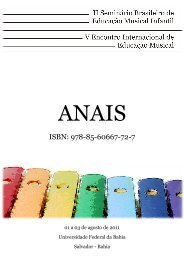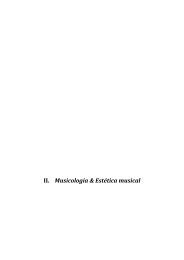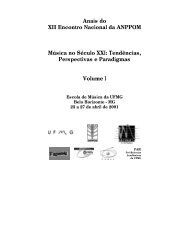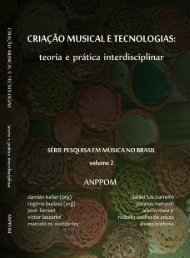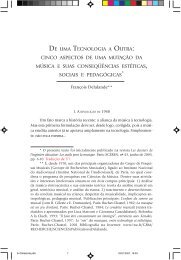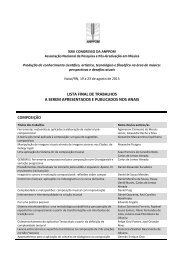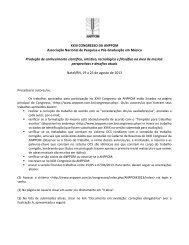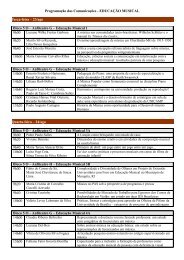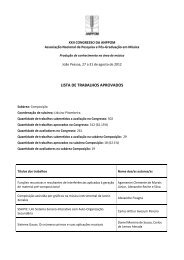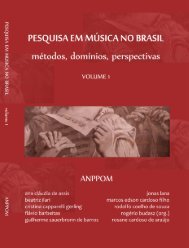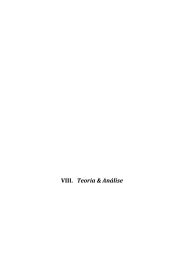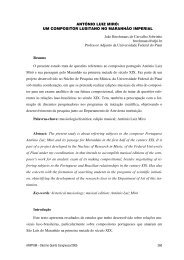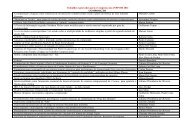download da versão impressa completa em pdf - anppom
download da versão impressa completa em pdf - anppom
download da versão impressa completa em pdf - anppom
You also want an ePaper? Increase the reach of your titles
YUMPU automatically turns print PDFs into web optimized ePapers that Google loves.
Dodecafonismo, nacionalismo e mu<strong>da</strong>nças de rumos:<br />
uma análise <strong>da</strong>s 6 Peças para piano de Cláudio Santoro<br />
e <strong>da</strong>s Miniaturas n. 1 para piano de Guerra-Peixe<br />
Ernesto Hartmann (UFES)<br />
Resumo: O presente artigo busca, a partir dos depoimentos de Claudio Santoro e César<br />
Guerra-Peixe, investigar <strong>em</strong> que medi<strong>da</strong> estes compositores estavam utilizando<br />
sist<strong>em</strong>aticamente a técnica dodecafônica no final <strong>da</strong> déca<strong>da</strong> de 1940. Através <strong>da</strong> análise de dois<br />
grupos de pequenas peças para piano dos dois compositores, relações entre seus processos<br />
composicionais e questões presentes <strong>em</strong> seus discursos <strong>da</strong> época são destacados. Conclui-se<br />
que ambos os compositores estavam realmente buscando uma nova forma de expressão,<br />
nacionalista por parte de Guerra-Peixe, porém s<strong>em</strong> ater-se a uma suposta rigidez do<br />
dodecafonismo.<br />
Palavras-chave: Claudio Santoro. César Guerra-Peixe. Dodecafonismo. Nacionalismo.<br />
Title: Dodecaphonism, Nationalism and Changes of Paths: a Comparative Analysis of the 6<br />
Peças para piano by Claudio Santoro and the Miniaturas n. 1 for Piano by César Guerra-Peixe<br />
Abstract: In this article we propose, based in the stat<strong>em</strong>ents by Claudio Santoro and César<br />
Guerra-Peixe, to investigate to what extent these composers had been syst<strong>em</strong>atically using the<br />
dodecaphonic technique at the end of the 1940s. Through the analysis of two groups of little<br />
pieces for piano, by both the composers, we <strong>em</strong>phasize relationships between their<br />
compositional processes and matters present on their speeches of that period. We concluded<br />
that both the composers were really looking for new means of expression, Nationalist from<br />
Guerra-Peixe, but without retain to the supposed rigidity of the Dodecaphonism.<br />
Keywords: Claudio Santoro. César Guerra-Peixe. Dodecaphonism. Nationalism.<br />
. . . . . . . . . . . . . . . . . . . . . . . . . . . . . . . . . . . . . . . . . . . . . . . . . . . . . . . . . . . . . . . . . . . . . . . . . . . . . . . . . . . . . . .<br />
HARTMANN, Ernesto. Dodecafonismo, nacionalismo e mu<strong>da</strong>nças de rumos: uma análise <strong>da</strong>s 6<br />
Peças para piano de Cláudio Santoro e <strong>da</strong>s Miniaturas n. 1 para piano de Guerra-Peixe. Opus,<br />
Porto Alegre, v. 17, n. 1, p. 97-132, jun. 2011.



